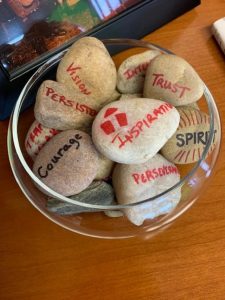It didn’t take long for chief deputy to the president of Stony Brook University, Judith Greiman, to impress her new boss.
When Maurie McInnis was interviewing for the job as president, Greiman drove her around and had breakfast with her.
The two spent a “good bit of time together,” McInnis said. “I immediately thought to myself, ‘If I’m lucky enough to get this position, I would be lucky if I could keep [Greiman] in that role.’ It was not a long evaluation process. She [is] an incredible asset.”
TBR News Media is pleased to recognize Greiman as a Person of the Year for 2021 for her tireless work at Stony Brook University.
Greiman is “behind the scenes doing her work with little fanfare, but she makes a tremendous impact,” said Carol Gomes, CEO of Stony Brook University Hospital.
Gomes cited Greiman’s decision making and her relationship with government agencies that work in tandem with the university. She also said Greiman has the university’s, community’s and students’ best interests at heart whenever she makes a decision.
Greiman’s colleagues are impressed by her dedication to work.
“I’m usually the second-to-last person to leave the suite,” said Braden Hosch, associate vice president for Institutional Research, Planning and Effectiveness. Greiman “is the last.”
Hosch knew her before the two joined Stony Brook University, when he was chief academic and financial officer at the State of Connecticut Office of Higher Education and Greiman was president of the Connecticut Conference of Independent Colleges. The two interacted regularly, sometimes on different sides of an issue.
“She always won,” Hosch recalled. “You want to make sure she’s the person in your corner.”
Hosch suggested that McInnis’ decision to keep Greiman as her chief of staff is a testament to Greiman’s deep institutional knowledge. She started her Stony Brook tenure on July 1, 2015, which is exactly five years to the day before McInnis joined the university.
Judith Brown Clarke, vice president for Equity and Inclusion and the chief diversity officer, appreciates the support she has received from Greiman.
Greiman is “so gracious with ensuring that she’s working with me on these strategies,” Brown Clarke said. “If I was doing it by myself, there may be some things I would think, not knowing the culture, that I may come up with a different solution.”

In addition to keeping the big picture goals in mind, Greiman had a well-received idea the week McInnis was inaugurated.
Greiman knew McInnis believed in the rocks, pebbles, sand metaphor for work. A management philosophy, the rocks represent the bigger picture goals or principles, while the pebbles are smaller issues and the sand represents even less significant but necessary items. Filling a bowl with rocks leaves room for sand and pebbles. Putting sand in first, however, could make it harder to include the necessary rocks.
“As a leader,” McInnis said, “we will be well served by understanding that you need to remember what your priorities are. Make sure you’re allocating your time toward those priorities,” which are the larger rocks.
“It’s a visual way to remind yourself that you have to think of the big rocks,” McInnis said.
Keeping this lesson in mind, Greiman collected rocks and asked the vice presidents to share a single word for each rock. Greiman gave McInnis a bowl of rocks with a word on each. The bowl sits on her desk.
Greiman’s word was “humor,” Gomes used the word “strategic,” while Brown Clarke shared a Japanese word that means a way of recognizing the beauty in imperfections.
“That’s how I see DEI,” Brown Clarke said. Filling imperfections in society with something of value can “make it beautiful.”
McInnis was thrilled with the gift.
While Greiman works such long hours that McInnis has urged her, unsuccessfully, to take time off, Greiman helps provide balance, humor, peace and muffins for her staff.
A talented baker, Greiman has provided those members of the staff who can or do eat sweets with goods she bakes at home.
Hosch savors her blueberry muffins with fresh ginger, while Brown Clarke enjoys the chocolate chip cookies.
McInnis, who remains active by kayaking and can’t eat most of the foods because of a gluten allergy, is grateful for everything Greiman brings to the proverbial table.
“I could not hope for a better person to work with,” McInnis said. “Not only does she have such an incredible command of all the issues, both the internal campus issues but also the external issues, but she does so with this amazing presence.”
McInnis said her deputy’s sense of humor “tends to set everybody right in the room. She is a very centered individual [who] has the ability to build the team and help everybody work through even the most difficult of situations.”






